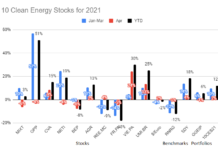Tom Konrad, Ph.D.
I have a regular column called Greener Money in Smart Energy Living Magazine. The Spring issue just printed, and I’d like to highlight this column, because it discusses ideas I have not written about elsewhere. The column begins:
As people become more aware of how we use energy, many become amazed and appalled at the sheer waste of it. Why are homes built without attention to insulation and sealing that would not only make them more comfortable, but also mean they cost less to live in, even with the slightly larger mortgage payments? Why do most microwaves use more electricity running the integrated clock than they do heating food?
The financial crisis can inspire similar emotions. Why did so many institutional investors buy collateralized debt obligations which they knew they did not understand? Why did regulators assume that these investors understood the risks they were taking? Why did lenders make loans to people without first verifying their ability to pay?
The answers to both sets of questions are surprisingly similar: both are manifestations of market barriers. In the realm of energy, these barriers lead to purchases which might be slightly cheaper in terms of first cost, but come with large ongoing energy costs, far higher than the lower initial cost can justify. In the case of the financial system, these barriers caused the build up of risks which were much greater than could be justified by the potential gains investors might have achieved by taking them on.
What are these barriers?
You can read the rest of the article here.









Sorry, but this comparison doesn’t ring true. The financial crisis has a lot more to do with the ethanol and upcoming battery debacle than poor energy choices.
For starters, there seems to be a widespread misunderstanding of the financial crisis. “More regulation” doesn’t magically solve credit cycle problems and in many cases it makes it worse.
Consider the three questions posed:
1) “Why did so many institutional investors buy collateralized debt obligations which they knew they did not understand?”
It’s not that they didn’t understand them and it’s certainly not something that could be solved with brute-force regulation (otherwise why did European banks get hit so hard?). The problem was that they and the rating agencies underestimated the downside risks. In addition, implicit government guarantees spurred risk taking by creating moral hazard.
2) “Why did regulators assume that these investors understood the risks they were taking?”
Banking is probably the most heavily regulated industry in the country. The notion that government regulators can better judge risks is contradicted by the fact that countries with heavily-regulated banking systems experience even more severe banking failures.
3) “Why did lenders make loans to people without first verifying their ability to pay?”
Because the government spurred them to do so with the toxic political interference in banking decisions. Banks like Citibank and Countrywide played along where allowed to grow and expand while banks who didn’t were prevented from acquiring other banks and opening branches.
Overall, I think you have the right idea about the danger of poorly aligned incentives, but nothing messes up incentives like a powerful central government and heavy-handed bureaucrats.
-Mercy
Mercy,
We have a simple philosphical disagreement here. My belief is that market failures abound, and government has a role in trying to correct such failures. Governmetn usually makes a mess of market intervention, but often gets things approximately right on the third or fouth try, and the result is often better than the continuing market failure.
We may have philosophical disagreements, but the effect of various levels of government regulation and identification and resolution of market failures are empirically resolvable issues.
The economic literature speaks very clearly to the effect of greater government control and regulation of industry.
The real point where we differ philosophically is not about the efficiency of the government telling me how to conserve energy, but rather to what extent the government should be coercing me into making uneconomical choices.
I’d love to hear some of the examples where the government has “gotten it right” nationalizing, heavily regulating or subsidizing an industry after 3 or 4 tries.
Banking? Ethanol? Corn? Autos?
-Mercy
Banking – the problem was not enough regulation, combined with federal insurance.
Ethanol – The problem was subsidies, not regulation.
Corn – see ethanol.
Autos – Again, not enough regulation. CAFE standards have been a joke for years.
In othere words, the gov’t (at least in the US) fails more often by not doing enough than by doing too much…
The economic literature is generally theoretical, and assumes that markets are efficient. Where markets are not efficienct (for instance, where large extrenalities exist) regulation is in order. In all the 4 examples you choose above there are large externalities, either environmental ones, or the smooth functioning of the financial system.
In terms of the government telling you to conserve energy, there is a role for that so long as the harm that is done to you is not outweighed by the benefit to the world in reduced carbon (and other) emissions. However, the government need not madate that you be efficienct; bribing you (through a utility DSM program) may be a more palatable option. This is another example of externalities, in the emissions you create by not taking reasonable efficiency measures. (If you do take reasonabe efficiency measures, why are you upset about the gov’t telling you to do what you would do anyway?)
First subsidies are generally just as bad or worse. I don’t object to the government correcting externalities for which the Coase theorem doesn’t apply (like pollution) and I can accept the argument that the government should engage in value-destroying redistribution as an element of political preference or philosophy.
However, the idea that the government is generally effective at micro-managing things like microwave LED clocks is simply wrong.
Also, the benefits of privatization and deregulation are not just a matter of “theory”, but observable results. It’s actually the interventionist theory that doesn’t work out. The “market failures” are easily fixed on paper, but when politicians intervene, the incentives are misaligned and instead of efficient microwave LED’s you get payouts to political interests. I had Stiglitz for Global Econ. Here’s a very smart guy who was pulling for the Soviet dream until the very end and now he goes around hawking asymmetrical info as the hammer to pound every nail that separates him from his newest socialist utopia.
From your profile, it looks like you’re a holder of the CFA(R) charter r ;-). Congrats! Might I suggest you dig out the Level 3 curriculum and review the determinants of economic growth and the effects of deregulation and privatization of industry? Like it or not, that’s how the international investors price emerging market debt and equity.
Again, I think you have the right thing about business dynamics. It’s important to be aware of information asymmetries as well as the quirky ways the market works, but I think you’ll be hard-pressed to find examples efficiently run government industries.
-Mercy
I think we basically agree, then. I simply am more optimistic about some government interventions.
Microwave clocks are a relatvely simple example. This is a case of imperfect market information and myopic decisionmaking on the part of the microwave buyer. Because the buyer has no information about the energy usage of the clock, he does not demand an efficienct version, which can be manufactured for about 25 cents more. Since the clock burns a few dollars of electricity a year, this is clearly not in the buyer’s self-interest.
The solution is simple, and starting to be implemented (in California at least): madatory standby enegy usage requirements. There is no reason for the microwave clock to draw several watts when a digital watch uses only a fraction of a watt. With such regulations, both the consumer and society are better off.
I’m not a CFA(R) charterholder yet… although I may be soon. My work history is currently under review by the CFAI, and this is the final step.
Certainly economic growth is generally slower with more regulation, but GDP growth is higher with better regulation.
Many regulations are good for growth. We have standards that keep the microwave from electrocuting the owner (his death would be bad for growth.) Reasonable regulations on energy usage are also good for growth, because the cost savings on wasted energy are circulated back into the economy as productinve spending.